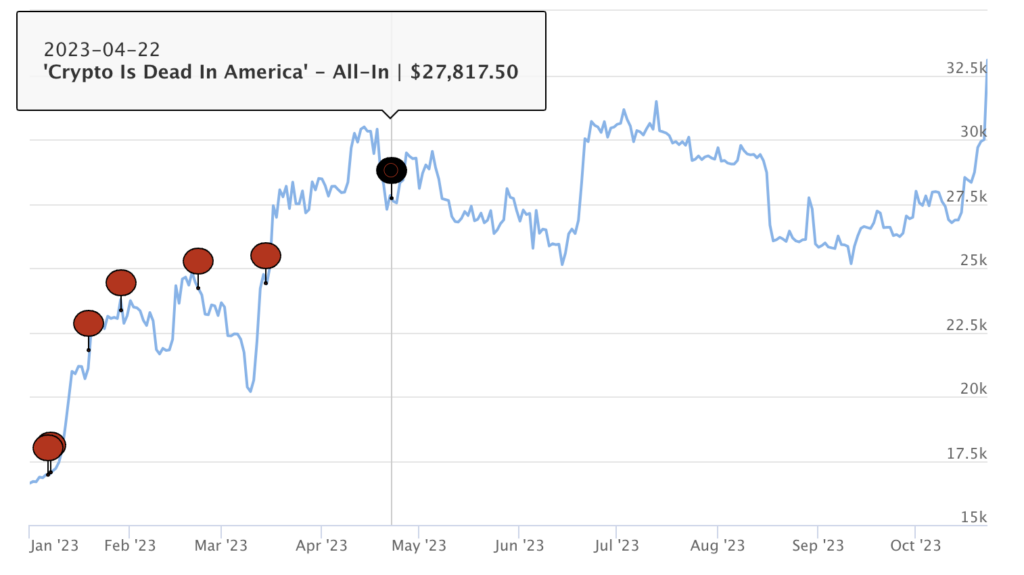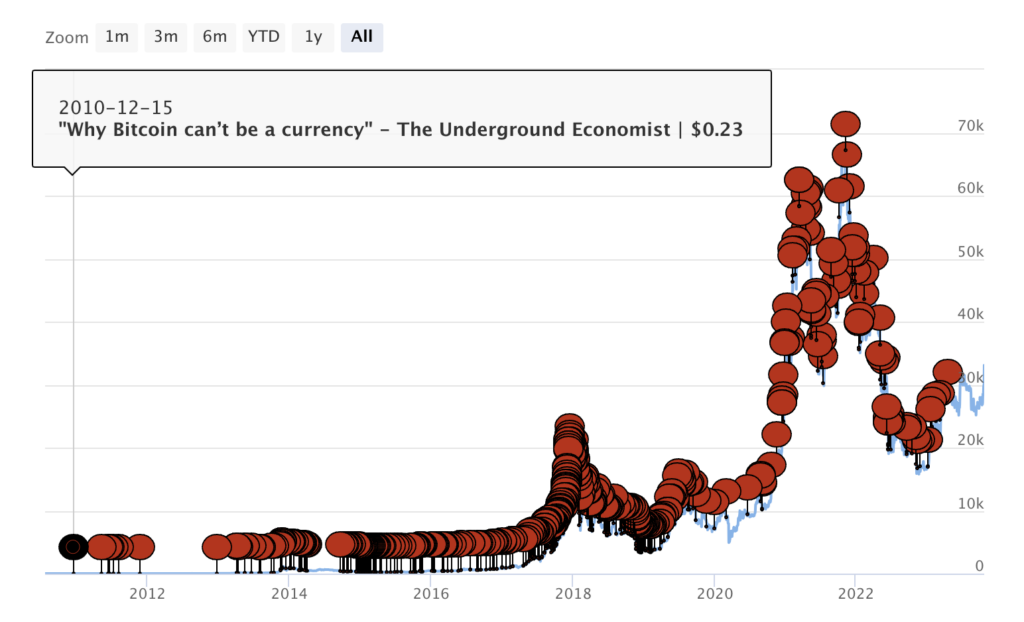
Like a phoenix rising from the ashes, Bitcoin has once again defied critics and bounced back from predictions of its demise.
The leading cryptocurrency has faced hundreds of so-called “obituaries” declaring it dead or doomed to fail since its creation in 2009. Yet Bitcoin has shown longevity and resilience in the face of constant critiques. According to 99bitcoins, the latest recorded ‘death’ was back in April when the price declined from $31,000 to $27,500.

Reviewing the historical ‘obituaries,’ CNBC and Bloomberg appear most frequently, with 35 and 24 articles calling for the death of Bitcoin, respectively. Headlines included ‘Bitcoin Is Still Doomed, ‘Bitcoin Is A Decentralized Ponzi Scheme,’ and ‘Bitcoin Isn’t The Future Of Money.’
While the cryptocurrency’s long-term trajectory depends on many factors, its ability to repeatedly recover from crashes and criticism is noteworthy. The cryptocurrency continues to find renewed life after each metaphorical funeral.
Bitcoin’s recent bullish movement and endorsement from BlackRock brings its price to around $34,000 as of Oct. 24, following a period of stability around the $27,000 mark between March and October, up 78% over the past year.
Accompanying the latest peak was a spike in trading volume, signaling increased buying pressure.
Bitcoin died and rose again.
The number of predictions of Bitcoin’s demise generally increased over time as crypto went more mainstream. From just a handful in the early years, obituaries numbered in the hundreds starting in 2017 when Bitcoin prices spiked.

Critics often declared Bitcoin dead during major price crashes, with clusters of obituaries around events in late 2017, early 2018, March 2020, and mid-2021. Volatility prompted accusations of bubbles bursting, like the 2013 headline “The Bitcoin Bubble Has Burst,” when the price was just $84.
Both experts and casual commentators have foretold Bitcoin’s failure. Sources range from mainstream media to individual bloggers, showing broad skepticism.
Initially more measured, criticism grew more hyperbolic over time. Early headlines expressed doubt, while later proclamations labeled Bitcoin a scam, Ponzi scheme, or a bubble ready to pop like 2021’s “Bitcoin Is Worse Than A Madoff-style Ponzi Scheme” in the Financial Times.
Some sources persistently predict Bitcoin’s downfall despite being proven wrong by its continued survival. An ongoing desire by some to see cryptocurrency fail appears present.
The reasons cited evolved from Bitcoin’s inability to function as money to lack of regulation, environmental harm, and competition from other coins. Yet, the core narrative of impending collapse persisted.
While Bitcoin has been proclaimed dead 474 times, it endures, whether rising from ashes or emerging from each’ death.’ The recurring story of underestimation remains unfinished, with Bitcoin’s next chapter still unwritten.
All eyes fall on the highly anticipated spot Bitcoin ETF from BlackRock as the investment firm looks to add Bitcoin to its trillions of dollars worth of assets under management.
If Bitcoin is dead, why did no one tell Larry Fink?
Credit: Source link






















 Bitcoin
Bitcoin  Ethereum
Ethereum  Tether
Tether  Solana
Solana  XRP
XRP  Dogecoin
Dogecoin  USDC
USDC  Lido Staked Ether
Lido Staked Ether  Cardano
Cardano  TRON
TRON  Avalanche
Avalanche  Shiba Inu
Shiba Inu  Wrapped stETH
Wrapped stETH  Wrapped Bitcoin
Wrapped Bitcoin  Toncoin
Toncoin  Sui
Sui  WETH
WETH  Bitcoin Cash
Bitcoin Cash  Chainlink
Chainlink  Pepe
Pepe  Polkadot
Polkadot  Stellar
Stellar  LEO Token
LEO Token  NEAR Protocol
NEAR Protocol  Litecoin
Litecoin  Aptos
Aptos  Wrapped eETH
Wrapped eETH  Uniswap
Uniswap  USDS
USDS  Cronos
Cronos  Hedera
Hedera  Internet Computer
Internet Computer  Ethereum Classic
Ethereum Classic  Bonk
Bonk  Bittensor
Bittensor  Render
Render  Ethena USDe
Ethena USDe  POL (ex-MATIC)
POL (ex-MATIC)  WhiteBIT Coin
WhiteBIT Coin  Dai
Dai  MANTRA
MANTRA  Artificial Superintelligence Alliance
Artificial Superintelligence Alliance  dogwifhat
dogwifhat  Arbitrum
Arbitrum  Monero
Monero  Stacks
Stacks  Filecoin
Filecoin  OKB
OKB 
